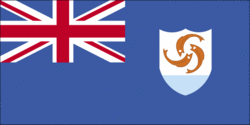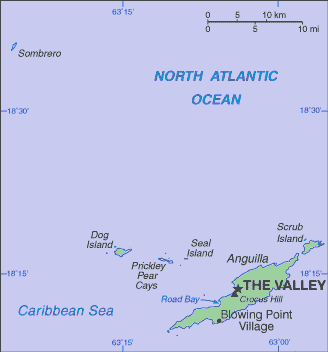Traveling Luck for Anguilla. Anguilla, North America
Anguilla is located in Caribbean, islands between the Caribbean Sea and North Atlantic Ocean, east of Puerto Rico.
Land in Anguilla is flat and low-lying island of coral and limestone.
Anguillan land covers an area of 102 square kilometers which is about half the size of Washington, DC
 Anguillan national flag (Flag of Anguilla)
Anguillan national flag (Flag of Anguilla)
As for the Anguillan climate; tropical; moderated by northeast trade winds.
Anguillan(s) speak English (official).
Places of note in Anguilla
 Anguillan map
Anguillan map
Regions of Anguilla
Colonized by English settlers from Saint Kitts in 1650, Anguilla was administered by Great Britain until the early 19th century, when the island - against the wishes of the inhabitants - was incorporated into a single British dependency, along with Saint Kitts and Nevis. Several attempts at separation failed. In 1971, two years after a revolt, Anguilla was finally allowed to secede; this arrangement was formally recognized in 1980, with Anguilla becoming a separate British dependency.
Anguilla has few natural resources, and the economy depends heavily on luxury tourism, offshore banking, lobster fishing, and remittances from emigrants. Increased activity in the tourism industry, which has spurred the growth of the construction sector, has contributed to economic growth. Anguillan officials have put substantial effort into developing the offshore financial sector, which is small, but growing. In the medium term, prospects for the economy will depend largely on the tourism sector and, therefore, on revived income growth in the industrialized nations as well as on favorable weather conditions.
Anguillan natural resources include salt, fish, lobster
the most northerly of the Leeward Islands in the Lesser Antilles
Anguillan religion is Anglican 29%, Methodist 23.9%, other Protestant 30.2%, Roman Catholic 5.7%, other Christian 1.7%, other 5.2%, none or unspecified 4.3% (2001 Census).
Natural hazards in Anguilla include frequent hurricanes and other tropical storms (July to October).
Travel Advice for Anguilla
AnguillaSUMMARY
- Anguilla is a British Overseas Territory. There is no formal British diplomatic or consular representation in Anguilla and the local authorities deal with all requests for consular assistance. The General section of his Travel Advice gives you more information about this.
- Most visits to Anguilla are trouble-free. However you should take sensible precautions to ensure your personal safety and to safeguard your possessions from theft.
- The hurricane season in Anguilla normally runs from June to November. Please see Natural Disasters section of this Travel Advice and Hurricanes for more information.
- The threat from terrorism is low, but you should be aware of the global risk of indiscriminate attacks which could be against civilian targets, including places frequented by foreigners.
- We strongly recommend that you obtain comprehensive travel and medical insurance before travelling. You should check any exclusions, and that your policy covers you for the activities you want to undertake. Please see: Travel Insurance.
SAFETY AND SECURITY
There is a relatively low rate of crime in Anguilla. Nevertheless, you should take the same sensible precautions as you would at home, such as locking doors and windows at night and securing your car when you leave it. Do not leave valuables lying around; keep them in your hotel or other safe deposit box.
Political Situation
The next election is due by March 2010.
Anguilla Country Profile
Road Safety
There is no public transport except taxis but car rental is widely available. You will need to bring your driving licence if you plan to rent a car (and obtain a local driving licence from the car rental company at a cost of US $20). Most rental cars are automatic, but manual ones can be obtained – it is best to order in advance. If driving a vehicle, remember to drive on the left, the same as in the UK. Observe speed limits and do not drink and drive.
LOCAL LAWS AND CUSTOMS
Topless/nude bathing is not permitted.
You should observe the customs regulations on the importation and exportation of agricultural products and the protection of marine and animal life. There are a number of marine and animal specimens that may not be taken from the island. If in doubt you should check with the local customs authorities prior to the purchase, importation or exportation of such items.
For those returning to the UK, please observe the UK Customs and Excise rules on the illegal importation of meat and animal products.
ENTRY REQUIREMENTS
Single parents or other adults travelling alone with children should be aware that some countries require documentary evidence of parental responsibility before allowing lone parents to enter the country or, in some cases, before permitting the children to leave the country.
HEALTH
With just one small hospital and three private clinics on the Island, medical facilities are relatively limited. Serious cases requiring major surgery may have to be transferred to neighbouring islands or to Miami once stabilised.
You should seek medical advice before travelling and ensure that all appropriate vaccinations are up to date. For further information on health, check the Department of Health’s website at: www.dh.gov.uk.
NATURAL DISASTERS
The hurricane season in the Anguilla normally runs from June to November. You should monitor local and international weather updates from the World Meteorological Organisation. You can also access the National Hurricane Centre for updates. Please also see the Hurricanes for detailed information about what to do if you are caught up in a hurricane.
GENERAL
Anguilla is a British Overseas Territory and as such there is no formal British Consular Representation. The Governor's Office will assist British nationals in a genuine emergency, but all enquiries regarding passport services should be made to the British High Commission in Bridgetown, Barbados at the address shown below. Routine passport replacements can be arranged through the Government of Anguilla Passport Office but this can take up to six weeks.
British High Commission
Lower Collymore Rock
(PO Box 676)
Bridgetown
Barbados
Tel: 00 1 246 430 7800
Fax: 00 1 246 430 7860
e-mail: britishhc@sunbeach.net
Office Hours: GMT: Mon-Thurs: 1200-2000 Friday: 1200-1700
Since 11 September 2001, all airlines require earlier check-in times for passengers and luggage. All items of luggage are subject to search. You should allow extra time at the airport and should check with the individual airline for the recommended check-in time for their flight.
Most major credit cards are accepted in local shops, hotels and restaurants. The local currency is the Eastern Caribbean dollar (EC$). It is fixed to the US Dollar at EC$2.7 = 1 US Dollar. US Dollars are widely accepted. The territory has modern banking facilities, including ATM machines.
OTHER

 Search
Search Anguilla country profile
Anguilla country profile Travel advice for Anguilla
Travel advice for Anguilla